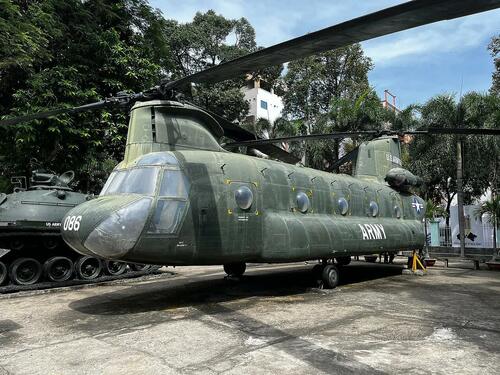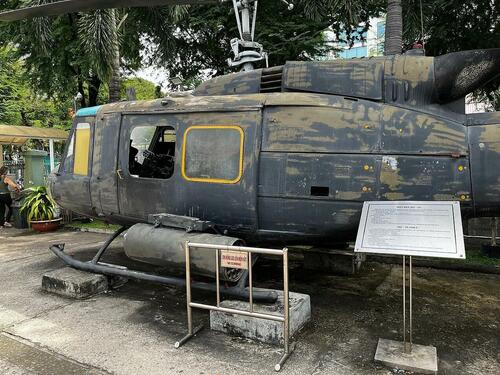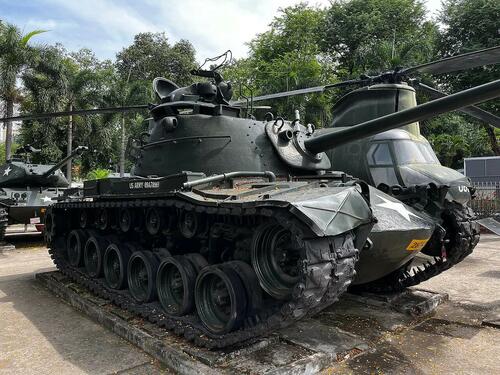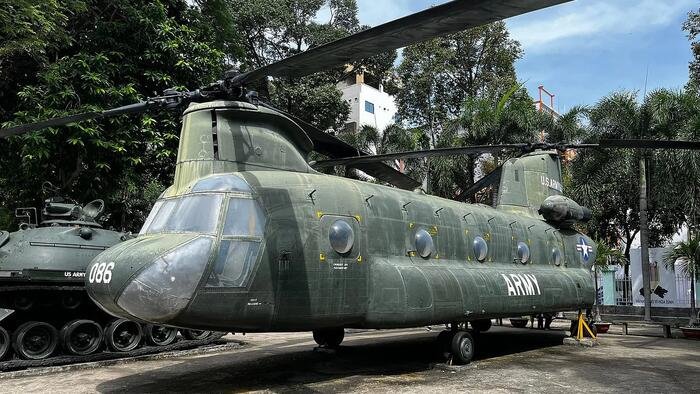Written by Hans Mahncke via Truth Over News,
My admiration for Vietnam and its people dates back to my first trip 25 years ago. The country has always held a special place in my heart, which is why I recently made a return visit after the Covid pandemic. While Vietnam’s charm and character remain as captivating as ever, this particular visit felt different. Although I have explored the Cu Chi Tunnels, the War Remnants Museum, and observed daily life in Vietnam on multiple occasions, this visit had a unique impact on me. Perhaps it was the backdrop of Trump’s re-election, offering a chance for change and peace, that led me to reflect deeply on the Vietnam War—especially on the lessons it should have taught us about the current conflict in Ukraine.
The War Remnants Museum in Saigon, in particular, with its display of abandoned American military equipment, is a must-visit for everyone. It serves as a powerful reminder not only of the immense human cost of war—something all war museums convey—but also of the specific senselessness of the Vietnam War.
The highlight of the War Remnants Museum is its collection of left-behind American military gear, and this is no coincidence. These artifacts effectively communicate the central message of the museum: the folly of intervening in a distant conflict without sufficient understanding, engaging in extensive bombing, and then withdrawing when plans fail, leaving behind chaos. However, there is no sense of victory or pride. The abandoned equipment speaks volumes on its own. If blame is to be assigned at all, it points towards the corrupt South Vietnamese leadership, painting the United States more as a misguided participant—caught in a conflict it neither comprehended nor should have entered in the first place.

Similarly, what struck me the most during my visit, not for the first time, was the incredible warmth and hospitality shown by the Vietnamese people towards foreigners, especially Americans. This contrast between past conflict and present-day generosity not only showcases the resilience and forgiveness of the Vietnamese people but also emphasizes the deep tragedy of the conflict. The pain and agony endured seem even more heartbreaking when juxtaposed with the fact that these two nations never needed to engage in conflict with each other.
At its core, the Vietnam War was a battle for independence and self-determination. However, from the American viewpoint, it turned into a quagmire of misunderstandings and strategic errors. Often overlooked amidst conflicting narratives is the reality that, after enduring a century of French colonial rule, the foremost goal of the Vietnamese people was to achieve independence. Foreign interference, regardless of intentions, was unlikely to succeed in such a scenario. The failure of the United States to grasp this truth led to its involvement in a conflict that was both senseless and unwinnable. Motivated by exaggerated Cold War anxieties, much like the media narratives shaping discussions on the ongoing war in Ukraine, the United States opted for intervention.

The sense of hopelessness surrounding the Vietnam War is not just a thing of the past. The parallels with the current crisis in Ukraine are evident. Once again, a regional conflict has been escalated by external powers, particularly the United States, under the guise of ideological or strategic imperatives. In both scenarios, local tensions were inflamed, turning what could have been contained disputes into global crises with significant worldwide ramifications.
What makes both wars especially tragic is the aspect of misguided intervention. In Vietnam, American interference escalated a civil war, turning it into a Cold War battleground at the expense of millions of lives. In Ukraine, despite the stated motives focusing on defending sovereignty and democracy, the outcomes are equally dire: numerous casualties, displaced populations, and a dangerous slide towards World War III.
In both cases, U.S. involvement was justified as pursuing noble objectives—whether combating communism or upholding the international order—but the results reveal a different truth, characterized by immense human suffering and global instability.
The origins of the conflict in Ukraine are more intricate than portrayed in mainstream media narratives. It did not commence with Putin’s invasion in February 2022 but can be traced back to the political upheaval of February 2014, when then-Vice President Joe Biden supported a coup d’état that led to the removal of Ukraine’s democratically elected government. This event sparked a decade-long civil conflict between the country’s Russian-speaking and Ukrainian-speaking regions.
Setting aside the fact that Biden unwisely reignited centuries-old ethnic divisions, what stake does the United States have in this situation? And how will American involvement resolve these deep-rooted conflicts?

However, the situation is even more troubling. American involvement in Ukraine is, in at least one critical aspect, more problematic than its involvement in the Vietnam War. While Vietnam was already embroiled in a civil conflict before the U.S. entered the picture, in Ukraine, external intervention—specifically by Joe Biden—played a pivotal role in sparking the civil war in the first place. This distinction underscores the far-reaching and profound consequences of foreign meddling in local disputes, even when well-intentioned.

As I journeyed through Vietnam, the weight of these connections was palpable. A war fought decades ago in the name of ideology now serves as a stark lesson in unintended consequences, yet similar errors are being repeated today. The remnants of the Vietnam War—decaying tanks, poignant images of victims, and heart-wrenching tales of suffering—serve as haunting reminders of the devastation caused when foreign powers escalate regional disputes into proxy wars.
What heightens the tragedy of such conflicts is how avoidable they are. The Vietnam War did not have to unfold the way it did. The United States did not have to play the role it did. The lessons gleaned from Vietnam should guide our understanding of Ukraine: wars waged far from home, under the guise of noble ideals, often inflict more harm than good on those they claim to safeguard.
This trip to Vietnam left me with a profound sense of grief—more so than any previous visit. It was not just for the lives lost and dreams shattered, but also for the cyclical pattern of human folly. By acknowledging the senselessness of one war, perhaps we can prevent the unnecessary escalation of another.
Loading…

